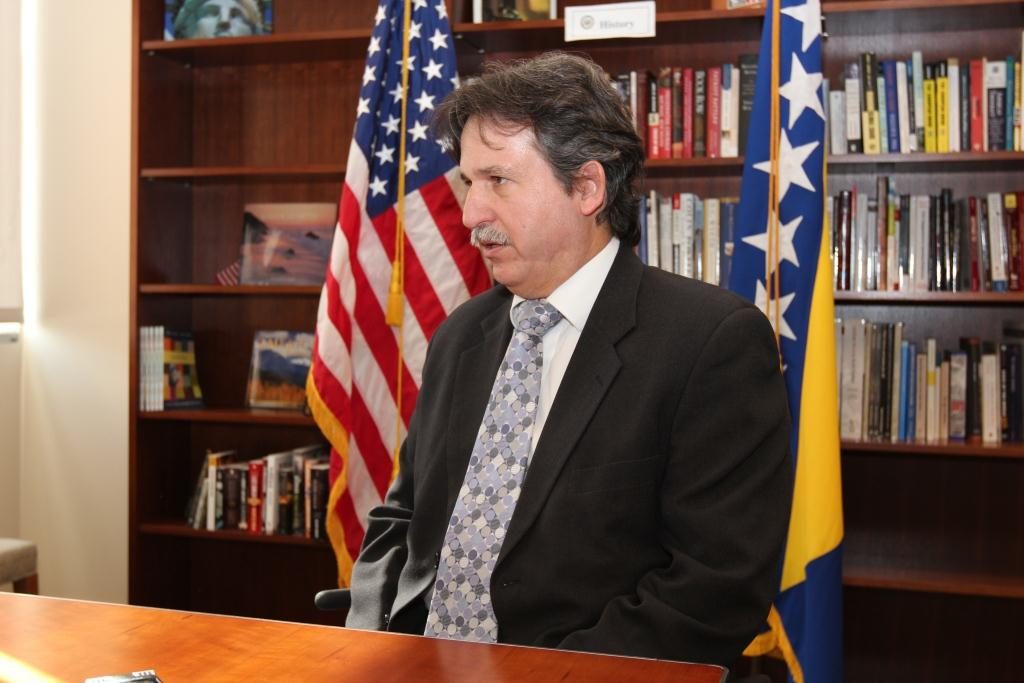
Jess Kuntz speaks with Thomas Mesa, Acting Deputy Chief of Mission, about the US Embassy’s work in Bosnia-Herzegovina.
The US Foreign Service is structured to provide its officers with a big picture view. Over the course of a 25+ year State Department Career, Acting Deputy Chief of Mission Thomas Mesa has served in countries as diverse as Paraguay, Romania, Pakistan and now, Bosnia-Herzegovina. The diversity of his CV equips him to tease out similarities between situations, whilst remaining mindful of each country’s unique dynamics.
Now on his third year in Sarajevo, Acting DCM Mesa aptly applies that perspective to Bosnia. Despite local hand wringing over the institutional constraints imposed by the Dayton Constitution, Mesa does not see it as inherently problematic in an institutional sense. Dayton not only brought order to an unstable situation, but “what many leaders forget is that it lays out the civil rights that pertain to all citizens, including peaceful assembly and freedom of expression.” The United States’ primary goal in Bosnia is to assist the nation in moving towards NATO and EU membership – the Dayton Constitution, Mesa says, is not, in and of itself, an obstacle to that vision.
“I personally think it’s not so much the governing structures of Dayton … but more importantly the political will. Are the leaders of Bosnia willing to do what they have to do to move the country forward? Are they willing to compromise on certain issues? Are they willing to find common ground? Are they willing to reach consensus?”
Anyone following recent developments in Sarajevo and Banja Luka is likely to answer Mesa’s questions in the negative. But, Mesa notes, Bosnian political parties behave much like their counterparts all over the world: they espouse their own views, they maneuver to political advantage. What is lacking is a strong system of what Mesa calls democratic infrastructure linking political leaders and citizens.
Traditionally, civil society organizations serve to link the two. Listening to Mesa, one encounters a dose of optimism concerning the state of civil society in Bosnia, particularly at the local level. The US Embassy’s small grants program has provided Mesa and his staff with a high level of exposure to the work of the NGO community. “They may not be big,” he notes. “They may not be well known, they’re not on the world map of civil society organizations but you do have a lot of NGOs that are carrying out a lot of good work and being effective.” If the accountability and responsiveness that is increasingly found on the local level can be replicated within higher levels of government, Bosnia’s deficit of democratic infrastructure might yet be rectified.
What then, is the prognosis for Bosnia & Herzegovina? While US objectives in Bosnia – movement towards NATO and EU membership – remain unchanged, the Embassy and State Department leadership engage in a constant process of reevaluating their approach to the country. The economy is a top concern – namely, getting politics out of business. So too is engagement with European Union and regional partners who can guide Bosnia in undertaking reforms that will bring it into alignment with EU membership requirements. But at the end of the day, whether or not Bosnia moves in that direction depends on Bosnia’s leaders. The system, Mesa insists, is not necessarily broken. It falls to individuals – both leaders and citizens – to find consensus and embark on the path forward.






